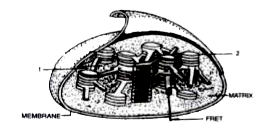Universal cell organelles (found in all living cells) are
Ribosomes
Plastids
Mitochondria
Vacuoles
The correct Answer is:A
To determine which of the given options are universal cell organelles found in all living cells, we will analyze each option step by step.
Step 1: Analyze Ribosomes
- Ribosomes are small organelles involved in protein synthesis.
- They are present in both prokaryotic cells (like bacteria) and eukaryotic cells (like plant and animal cells).
- In prokaryotes, ribosomes are of the 70S type, while in eukaryotes, they are of the 80S type.
- Since ribosomes are found in all living cells, they qualify as a universal cell organelle.
Step 2: Analyze Plastids
- Plastids are membrane-bound organelles primarily involved in photosynthesis and storage.
- They are found only in eukaryotic cells, specifically in plants and some protists.
- Prokaryotic cells do not have plastids.
- Therefore, plastids are not universal cell organelles.
Step 3: Analyze Mitochondria
- Mitochondria are known as the powerhouse of the cell, generating energy through cellular respiration.
- Like plastids, mitochondria are also membrane-bound organelles.
- They are present only in eukaryotic cells and are absent in prokaryotic cells.
- Thus, mitochondria are not universal cell organelles.
Step 4: Analyze Vacuoles
- Vacuoles are membrane-bound organelles that store substances and help maintain turgor pressure in plant cells.
- They are primarily found in eukaryotic cells, particularly in plant cells, and are present in some animal cells as well.
- Prokaryotic cells do not have vacuoles.
- Therefore, vacuoles are not universal cell organelles.
Conclusion
After analyzing all the options, we conclude that the only universal cell organelle found in all living cells is ribosomes.
Final Answer
The correct answer is Ribosomes.
---
- Ribosomes are small organelles involved in protein synthesis.
- They are present in both prokaryotic cells (like bacteria) and eukaryotic cells (like plant and animal cells).
- In prokaryotes, ribosomes are of the 70S type, while in eukaryotes, they are of the 80S type.
- Since ribosomes are found in all living cells, they qualify as a universal cell organelle.
- Plastids are membrane-bound organelles primarily involved in photosynthesis and storage.
- They are found only in eukaryotic cells, specifically in plants and some protists.
- Prokaryotic cells do not have plastids.
- Therefore, plastids are not universal cell organelles.
- Mitochondria are known as the powerhouse of the cell, generating energy through cellular respiration.
- Like plastids, mitochondria are also membrane-bound organelles.
- They are present only in eukaryotic cells and are absent in prokaryotic cells.
- Thus, mitochondria are not universal cell organelles.
- Vacuoles are membrane-bound organelles that store substances and help maintain turgor pressure in plant cells.
- They are primarily found in eukaryotic cells, particularly in plant cells, and are present in some animal cells as well.
- Prokaryotic cells do not have vacuoles.
- Therefore, vacuoles are not universal cell organelles.
After analyzing all the options, we conclude that the only universal cell organelle found in all living cells is ribosomes.
The correct answer is Ribosomes.
Topper's Solved these Questions
- THE UNIT OF LIFE BOOK - AAKASH SERIESCHAPTER - THE UNIT OF LIFE EXERCISE - EXERCISE - I (Microbodies )
5 Videos
- THE UNIT OF LIFE BOOK - AAKASH SERIESCHAPTER - THE UNIT OF LIFE EXERCISE - EXERCISE - I (Cytoskeleton )
2 Videos
- THE UNIT OF LIFE BOOK - AAKASH SERIESCHAPTER - THE UNIT OF LIFE EXERCISE - EXERCISE - I (Mitochondria )
20 Videos
- THE LIVING WORLD BOOK - AAKASH SERIESCHAPTER - THE LIVING WORLD EXERCISE - EXERCISE-III (Previous AIPMT/NEET Questions)
12 Videos
Similar Questions
Universal cell organelles are
View SolutionCommon semi autonomous cell organelles found in all eukaryotic cells are
View SolutionThe membraneless organelles in living cells are
View SolutionWhich non-membranous cell organelle is found in animal cell and helps in cell division?
View SolutionSmallest cell organelles are
View SolutionName two semi-autonomous cell organelles found in animal cell.
View SolutionStatement A : Ribosomes are membraneless organelles found in all cells.
Statement B : Cytoplasm is the main arena of cellular activities.
View SolutionName two semi-autonomous cell organelles found in an eukaryotic cell.
View SolutionGiven below is a diagrammatic representation of the internal structure of an organelle found in a plant cell. Study the same and then answer the questions that follow:

Identify the organelle.
View SolutionGiven below is a diagrammatic representation of the internal structure of an organelle found in a plant cell. Study the same and then answer the questions that follow:

Name the physiological process occurring in this organelle.
View Solution
